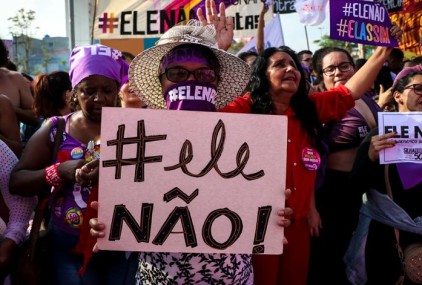Brazilian presidential election: a perfect catastrophe?
By Sonia Corrêa Time to mourn Politics is both reasoning and affect. This is how the first version of this essay, written in the immediate aftermath

Gender and Politics in Latin America
Since January 2018, SPW has been developing a research and action initiative on antigender politics in Latin America: the project Género y Política en América
Sexual Politics in January and February 2019
#Hail International Women’s Day 2019: struggle, endurance, resistance! #Eyes on Brazil From an insider´s point of view, observing Brazilian politics after January 1st is like being caught

Bolsonaro’s Brazil
The teratology of the contemporary political imagination – plentiful enough: Trump, Le Pen, Salvini, Orbán, Kaczyński, ogres galore – has acquired a new monster. Rising above
Sexual politics in October 2018
The Brazilian perfect storm We apologize for the delay in the circulation of SPW’s October 2018 monthly announcement due to the stormy process and result
Who are Jair Bolsonaro’s voters and what they believe
SPW gladly presents the ethnographic research work of Isabela Oliveira Kalil and her team at FESPSP on Bolsonaro and his different types of supporters. These

Brazil: Education and gender under attack
A specter of Dictatorship in Brazil – NACLA Brazil’s election of far-right Bolsonaro leaves researchers reeling – Chemistry World Bolsonaro poses a serious threat to

The Brazilian Perfect Storm: a compilation
As done in other similar occasions, such as in the 2016 Trump elections, SPW has collected and selected the largest possible number of news, opinions
How women can decide the Brazilian election
By Isabela Oliveira Kalil[1] An article published by The New York Times, on September 24, examined the Brazilian presidential election scenario and defined Jair Bolsonaro,
Women in the 2018 Brazilian elections: paradoxes and democratic resistance
By Denise Mantovani[1] and Maria Lígia Elias[2] It is not easy to analyze an electoral context in “real time”. But we cannot, however, escape from examining






